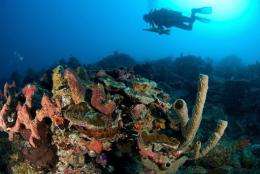Climate: UN report highlights ocean acidification

Carbon emissions from fossil fuels may bear a greater risk for the marine environment than thought, with wide-ranging impacts on reproduction, biodiversity richness and fisheries, a report at the UN climate talks here on Friday said.
Each year, billions of tonnes of carbon dioxide (CO2), the principal greenhouse gas, are absorbed by the sea and are very gradually turning the water more acidic, according to the study launched by the UN Environment Program (UNEP).
In the coming decades, the consequences are likely to be felt throughout the marine food chain, it said.
Rising acidity levels have an impact on calcium-based lifeforms, ranging from tiny organisms called ptetropods that are the primary food source, to crabs, fish, lobsters and coral, it said.
The report was compiled by scientists from Plymouth Marine Laboratory and the National Oceanography Centre in Britain, and the Intergovernmental Oceanographic Commission, part of the UN Educational, Scientific and Cultural Organisation (UNESCO).
"We are seeing an overall negative impact from ocean acidification directly on organisms and on some key ecosystems that help provide food for billions," said Carol Turley, a senior scientist at Britain's Ocean Acidification Research Programme, who headed the report.
"We need to start thinking about the risk to food security."
Turley cautioned there many unknowns about ocean acidification.
For instance, some research indicated that adult lobsters might actually increase shell-building in response to rising acidity levels, but it may be the juveniles who are less able to build healthy skeletons, she said.
Similarly, the smelling systems of some species of young fish could be impaired, but adults may be unaffected.
There could be some winners as well as losers, she said.
"It is clearly not enough to look at a (single) species. Scientists will need to study all parts of the life cycle to see whether certain forms are more or less vulnerable," Turley said.
UNEP chief Achim Steiner described ocean acidification as "yet another red flag being raised" about greenhouse gases.
"It is a new and emerging piece in the scientific jigsaw puzzle, but one that is triggering rising concern."
The report calls for cuts in man-made CO2 emissions to reduce acidification and support for further work to quantify the risk and identify species that could be most in peril.
The "greenhouse" effect from CO2 is already a known problem for the sea. By trapping solar radiation, the gas warms the atmosphere and thus the Earth's surface.
Warming has already been linked to changes in fish migration, and some biologists fear that cases of coral die-out in recent years are clearly linked to higher temperatures.
(c) 2010 AFP

















